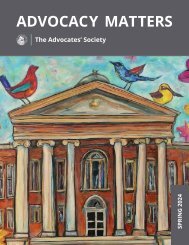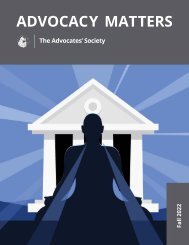Advocacy-Matters-Winter-2024
Keep up to date on what your fellow Society members have to say in Advocacy Matters.
Keep up to date on what your fellow Society members have to say in Advocacy Matters.
Create successful ePaper yourself
Turn your PDF publications into a flip-book with our unique Google optimized e-Paper software.
What were the main challenges you faced transitioning from a<br />
foreign-trained lawyer to practicing in Canada?<br />
MK: The main challenges I faced were (1) my own lack of knowledge about the local legal market; (2) my<br />
own difficulties integrating into the local culture; and (3) the local community’s lack of familiarity with and<br />
recognition of foreign credentials (at least where I was from).<br />
CC: Getting my foot in the door was certainly the biggest challenge. If you weren’t attending one of the<br />
schools from which a law firm recruited, you were ineligible for the first step in their process. Things have<br />
changed over the last 10 years, but there’s still room for improvement.<br />
VM: I found the entire NCA [National Committee on Accreditation] process, which assesses the legal education<br />
and professional experience of individuals who obtained their legal credentials outside Canada,<br />
to be a serious roadblock to practice as it took a long time to get through the exams and the cost was<br />
also prohibitive. The timing of the NCA process is also not coordinated with the timing of provincial bar<br />
exams.<br />
Are there specific areas of law or legal skills where you believe<br />
foreign-trained lawyers bring a unique perspective?<br />
MK: A comparative legal perspective is very helpful both because the fundamentals of legal reasoning<br />
might be more apparent to those with that perspective (because those fundamentals are the same<br />
among different systems) and because one has a default alternative manner of addressing particular<br />
legal problems.<br />
OO: Internationally-trained lawyers bring a wealth of much-needed diversity of experience, knowledge<br />
and approaches to the legal industry. On an academic level, most internationally-trained lawyers have<br />
had to take core legal courses more than once to get where they are.<br />
OO: It contributes to building a foundation for what is hopefully a life-long career. The more people appreciate<br />
the diversity you bring to the industry and rely on it, the better a lawyer they will make and get.<br />
Being merely “othered” with not much more helps no one.<br />
CC: Diversity and inclusion, in my view, should be as important for foreign-trained lawyers as it is for<br />
those trained in Canada—it enriches us all by bringing varied perspectives to the workplace and to the<br />
work we do for our clients.<br />
Have you encountered any misconceptions or stereotypes about foreign-trained<br />
lawyers in Canada, and if so, how do you address or challenge<br />
them?<br />
VM: Yes! I think people assume that foreign-trained lawyers are not as qualified as lawyers trained in<br />
Canada, which is so far from the truth. Especially when it comes to securing articling experiences, I have<br />
heard stories of lawyers being passed over because people are worried about language challenges or<br />
quality of the work, more generally. I have been extremely fortunate to have a degree from an internationally<br />
recognized law school and to come from a country that most Canadians are very familiar with.<br />
But for those who don’t have the same advantages, I have tried to assist on a personal level by mentoring<br />
and assisting people with making contacts in the legal community.<br />
OO: Most people bring their cultural competencies to the workplace, along with attendant biases and<br />
misconceptions. I used to think if you didn’t address them, your life would be easier. I don’t necessarily<br />
challenge; I educate. I need people to understand that being an internationally-trained lawyer doesn’t<br />
mean you got a lower quality of education. Above all, I tell people: When in doubt, ask the person concerned<br />
what works for them.<br />
If you could time travel, what advice would you give your past self when<br />
you were just starting your journey to practice law in Canada?<br />
Why is diversity and inclusion important for foreign-trained lawyers in<br />
Canada?<br />
VM: How could it not be? Clients come from all different types of backgrounds and having lawyers who<br />
can not only understand the differences, but may also have personal knowledge of significant cultural<br />
practices or events, can be critical to ensuring appropriate representation in some cases. Especially as a<br />
family lawyer, when we’re dealing with the substance of people’s most personal relationships, if there is<br />
a cultural or other difference that may have an impact on a resolution or the ability to move the case forward,<br />
then having lawyers who can navigate those issues with sensitivity can result in a better outcome<br />
for the whole family.<br />
CC: Is ‘stop and smell the roses’ too corny? It’s sometimes hard to appreciate how much fun this job is<br />
when you’re working long hours in high-stress situations in your first few years, but this job really is a lot<br />
of fun and it only gets better as time passes. But if you take a moment to reflect on what you’ve learned,<br />
how much you’ve grown, the challenges you’ve overcome over the last year, month, day – some days<br />
even the hour – it’s encouraging to see that progress and it pushes you through the tougher moments.<br />
VM: I think my only advice would have been to give myself a bit more grace when it came to the culture<br />
shock that I experienced. Although Toronto is very diverse, as a Black person moving from Washington,<br />
D.C. to Toronto, it was also a shock to no longer see many people who looked like me.<br />
20 21

















